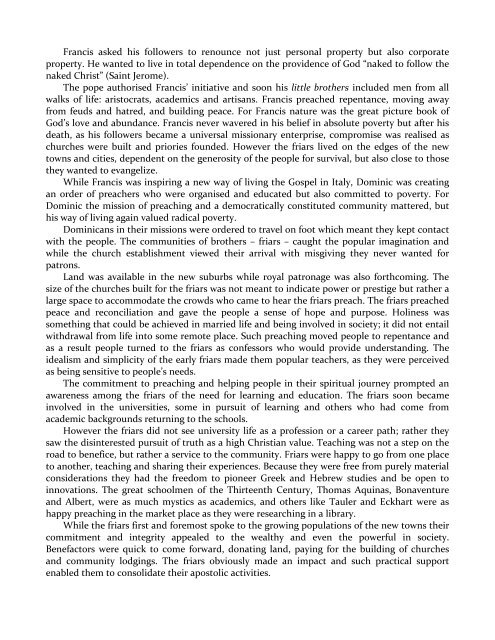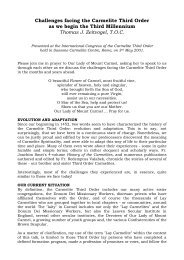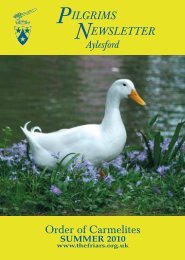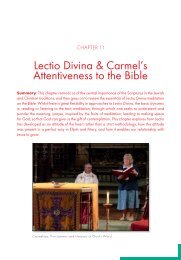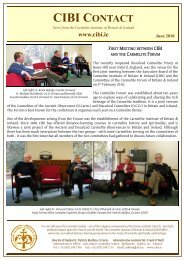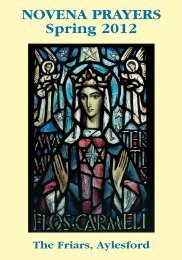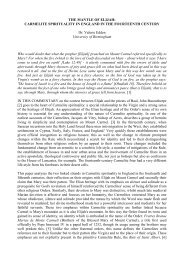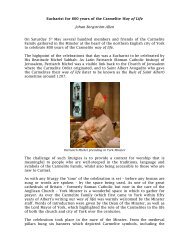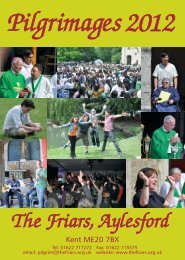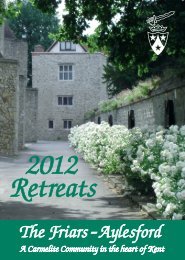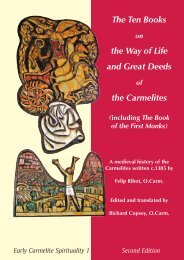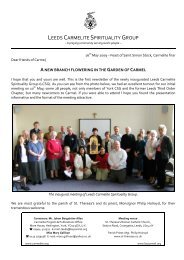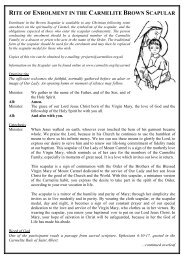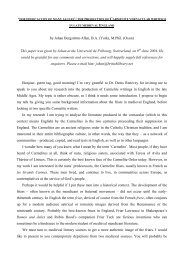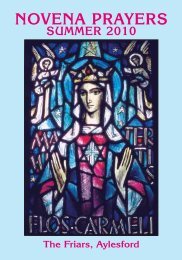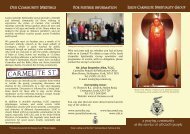Mendicant Friars – Justice and Peace
Mendicant Friars – Justice and Peace
Mendicant Friars – Justice and Peace
Create successful ePaper yourself
Turn your PDF publications into a flip-book with our unique Google optimized e-Paper software.
Francis asked his followers to renounce not just personal property but also corporate<br />
property. He wanted to live in total dependence on the providence of God “naked to follow the<br />
naked Christ” (Saint Jerome).<br />
The pope authorised Francis’ initiative <strong>and</strong> soon his little brothers included men from all<br />
walks of life: aristocrats, academics <strong>and</strong> artisans. Francis preached repentance, moving away<br />
from feuds <strong>and</strong> hatred, <strong>and</strong> building peace. For Francis nature was the great picture book of<br />
God’s love <strong>and</strong> abundance. Francis never wavered in his belief in absolute poverty but after his<br />
death, as his followers became a universal missionary enterprise, compromise was realised as<br />
churches were built <strong>and</strong> priories founded. However the friars lived on the edges of the new<br />
towns <strong>and</strong> cities, dependent on the generosity of the people for survival, but also close to those<br />
they wanted to evangelize.<br />
While Francis was inspiring a new way of living the Gospel in Italy, Dominic was creating<br />
an order of preachers who were organised <strong>and</strong> educated but also committed to poverty. For<br />
Dominic the mission of preaching <strong>and</strong> a democratically constituted community mattered, but<br />
his way of living again valued radical poverty.<br />
Dominicans in their missions were ordered to travel on foot which meant they kept contact<br />
with the people. The communities of brothers <strong>–</strong> friars <strong>–</strong> caught the popular imagination <strong>and</strong><br />
while the church establishment viewed their arrival with misgiving they never wanted for<br />
patrons.<br />
L<strong>and</strong> was available in the new suburbs while royal patronage was also forthcoming. The<br />
size of the churches built for the friars was not meant to indicate power or prestige but rather a<br />
large space to accommodate the crowds who came to hear the friars preach. The friars preached<br />
peace <strong>and</strong> reconciliation <strong>and</strong> gave the people a sense of hope <strong>and</strong> purpose. Holiness was<br />
something that could be achieved in married life <strong>and</strong> being involved in society; it did not entail<br />
withdrawal from life into some remote place. Such preaching moved people to repentance <strong>and</strong><br />
as a result people turned to the friars as confessors who would provide underst<strong>and</strong>ing. The<br />
idealism <strong>and</strong> simplicity of the early friars made them popular teachers, as they were perceived<br />
as being sensitive to people’s needs.<br />
The commitment to preaching <strong>and</strong> helping people in their spiritual journey prompted an<br />
awareness among the friars of the need for learning <strong>and</strong> education. The friars soon became<br />
involved in the universities, some in pursuit of learning <strong>and</strong> others who had come from<br />
academic backgrounds returning to the schools.<br />
However the friars did not see university life as a profession or a career path; rather they<br />
saw the disinterested pursuit of truth as a high Christian value. Teaching was not a step on the<br />
road to benefice, but rather a service to the community. <strong>Friars</strong> were happy to go from one place<br />
to another, teaching <strong>and</strong> sharing their experiences. Because they were free from purely material<br />
considerations they had the freedom to pioneer Greek <strong>and</strong> Hebrew studies <strong>and</strong> be open to<br />
innovations. The great schoolmen of the Thirteenth Century, Thomas Aquinas, Bonaventure<br />
<strong>and</strong> Albert, were as much mystics as academics, <strong>and</strong> others like Tauler <strong>and</strong> Eckhart were as<br />
happy preaching in the market place as they were researching in a library.<br />
While the friars first <strong>and</strong> foremost spoke to the growing populations of the new towns their<br />
commitment <strong>and</strong> integrity appealed to the wealthy <strong>and</strong> even the powerful in society.<br />
Benefactors were quick to come forward, donating l<strong>and</strong>, paying for the building of churches<br />
<strong>and</strong> community lodgings. The friars obviously made an impact <strong>and</strong> such practical support<br />
enabled them to consolidate their apostolic activities.


